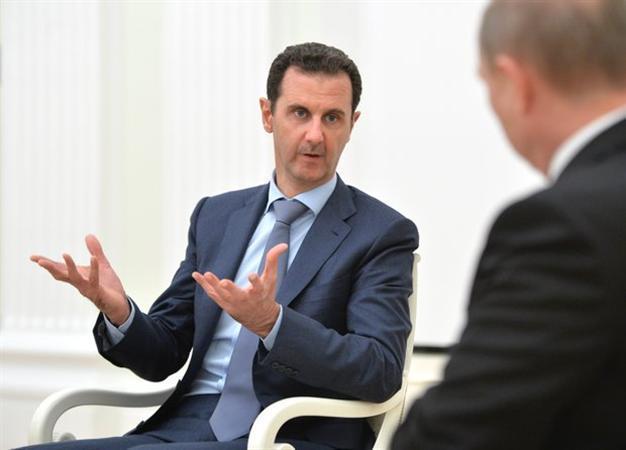US slams Assad's 'red-carpet' welcome in Moscow
MOSCOW - Agence France-Presse

In this photo taken on Tuesday, Oct. 20, 2015, Syria President Bashar Assad gestures during his meeting with Russian President Vladimir Putin, back to the camera, in the Kremlin in Moscow, Russia. AP photo
The White House issued a scathing attack on Russia's "red carpet" welcome for Syrian President Bashar al-Assad on Oct. 21, accusing Moscow of impeding progress towards a political transition by propping up the strongman.
Assad met Vladimir Putin in Moscow on Oct. 20 and thanked his Russian counterpart for launching airstrikes against his opponents in Syria, with both leaders also agreeing during talks that political steps must follow military operations.
White House Deputy Press Secretary Eric Schultz told journalists the United States viewed "the red carpet welcome for Assad, who has used chemical weapons against his own people, as at odds with the stated goal by the Russians for a political transition in Syria."
Moscow's actions in the war-torn Middle-Eastern state were "counterproductive", he added.
Putin had emphasised during Assad's visit that Syrians should decide their country's fate, a thinly veiled jab at the US and other opposition backers who insist Assad must go in any peaceful settlement.
"Based on positive results in military operations at the end of the day a long-term settlement can be achieved on the basis of a political process with the participation of all political forces, ethnic and religious groups," the Russian president said.
Russia later announced that Foreign Minister Sergei Lavrov would meet Friday with US Secretary of State John Kerry and their Turkish and Saudi counterparts to discuss Syria.
Assad, who last visited Russia in 2008, had told Putin that the three-week-old Russian air war -- which has prompted an outcry in the West -- had helped to stop the spread of "terrorism" in his country.
The strikes are reported to have killed 370 people so far, a third of them civilians.
Russia says the campaign targets the extremist Islamic State of Iraq and the Levant (ISIL) group and others it describes as "terrorists".
But rebels and the West accuse Moscow of seeking to keep Assad in power and of striking moderate and Islamist opposition forces rather than just ISIL jihadists.
Putin said Russia was ready to do all it could to help secure peace in Syria, which has been ravaged by the conflict that began with anti-government protests in March 2011.
"We are ready to make our contribution not only during armed hostilities in the fight against terrorism but also during a political process," Putin said.
Putin's spokesman Dmitry Peskov said Assad's "working visit" was at the invitation of the Kremlin. The Syrian presidency said Wednesday that Assad had returned to Damascus.
Putin discussed his talks with Assad in a string of phone conversations with Turkish leader Recep Tayyip Erdoğan, Saudi King Salman, Egyptian President Abdel Fattah al-Sisi and Jordan's King Abdullah.
More than 250,000 people have been killed and millions forced from their homes in the four-year Syrian war, sparking a mass migration of around four million refugees.
The Syrian Observatory for Human Rights said Oct. 21 at least 12 people including medical staff were killed when Russian warplanes struck a field hospital in the northwestern province of Idlib.
The clinic was run by the Syrian-American Medical Society, whose staff confirmed Tuesday's strikes had "severely damaged" the facility.
Saudi Arabia, Turkey and the US are all key backers of the Syrian opposition and have criticised Moscow's military intervention in support of Assad's regime.
They have also long insisted Assad cannot be part of Syria's future, though some experts see a softening of the international line on whether the embattled leader could stay on during a political transition.
One of Assad's key allies, Iran, appeared less than resolute in backing him on Oct. 21, with deputy foreign minister Hossein Amir-Abdollahian saying it would not work to keep Assad in power "forever".
Iran has stood by Assad since the 2011 uprising against his regime, but has played down the extent of its on-the-ground support.
French President Francois Hollande has warned Russia against strengthening the position of Assad, "who is the problem, and cannot therefore be the solution".
Russia has carried out more than 500 air raids in Syria since its campaign began last month.
The Russian defence ministry said Oct. 21 its forces had hit 83 targets in Syria in the past 24 hours.
The strikes have been accompanied by a series of Syrian government ground offensives, in some places reportedly backed by an influx of Iranian forces, as well as Lebanon's Shiite Hezbollah movement.
